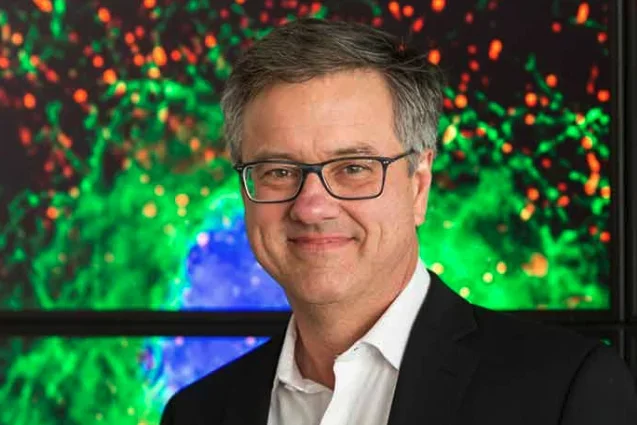Understanding Bacteria
Can We Improve Human Health By Understanding Bacteria?

Jeff F. Miller, PhD
Director, California NanoSystems Institute
Professor, Microbiology, Immunology & Molecular Genetics
Understanding Bacteria
Dr. Jeff F. Miller demystifies how bacteria works.
On a molecular level, Dr. Miller strives to define how bacteria infects hosts and causes disease. On a macro level, he studies how bacteria evolved the ability to perform a diverse range of functions that can alter ecosystems—and life in general.
Dr. Miller's research on bacteria informs a range of novel treatment strategies and contributes to emerging explorations of the microbiome's influence on human health.
Using Advanced Laboratory Techniques to Study Bacteria
Comprising experts in computational biology, bacterial genomics, bacterial physiology, neonatology, and more, Dr. Miller's lab deploys a range of multidisciplinary approaches to study bacteria in new ways.
The lab performs comprehensive studies of:
- Cellular signaling systems that lead bacteria to infect a host. Dr. Miller's lab studies Bordetella pertussis, which causes whooping cough, and Burkholderia pseudomallei, which causes lethal systemic diseases. Read more about this work in the Proceedings of the National Academy of Science.
- Genetic factors of bacterial virulence.
- Influences of infection on a host's cellular signaling systems.
- Biofilm formation that alters gene transcription.
- Retroelements that influence drug binding by altering target proteins in bacteria. Read more about this work in Nucleic Acids Research.
Translating Research to Improve Human Health
Dr. Miller translates his laboratory research to inform the development of precision antibiotics that address antibiotic resistance, a health crisis deepening as we discover deadly bacteria resistant to all available treatments. At UCLA, Dr. Miller and his colleagues use electron imaging and nanoengineering capabilities to create novel antibiotics that specifically and selectively kill pathogens.
Dr. Miller's in-depth studies of bacteria also contribute to UCLA's growing research enterprise focusing on the microbiome, the population of microorganisms in the human body. This collection of microorganisms influences a range of human diseases and may even be leveraged to treat infection. In fact, transplants of microbiota have already treated Clostridium difficile (C. diff) infections, which can cause severe colon damage.
Microbiome research promises to reshape the way we look at disease by allowing scientists to study humans as superorganisms made of a diverse collection of interacting microbiota. This paradigm shift uncovers new commonalities between diseases and systems once believed to be fundamentally separate. Scientists hope understanding the microbiome will lead to the development of innovative antibiotics and treatments that fight disease in unprecedented ways. Read more in U Magazine.
The Future: An Evolving Relationship Between Pathogens and Humans
Bacteria has played a huge role in human life thus far, and it will continue to play a role in our future. Dr. Miller's work promises to change our relationship with bacteria and benefit a range of human health outcomes, from infection to cancer.
In addition to conducting research, Dr. Miller also champions the technological advancements we need to maximize our understanding of human disease. He serves as director for the California NanoSystems Institute (CNSI), which offers cutting-edge infrastructure and services to bolster interdisciplinary discoveries. The CNSI recently announced a partnership with Leica Microsystems to build the Leica Microsystems Center of Excellence (CoE) at UCLA. The center's technology will enable scientists to investigate, and therefore understand, molecular processes in more detail than ever.
With research and technology advancing together, Dr. Miller and his colleagues are positioned to reveal many more of bacteria's enlightening secrets.